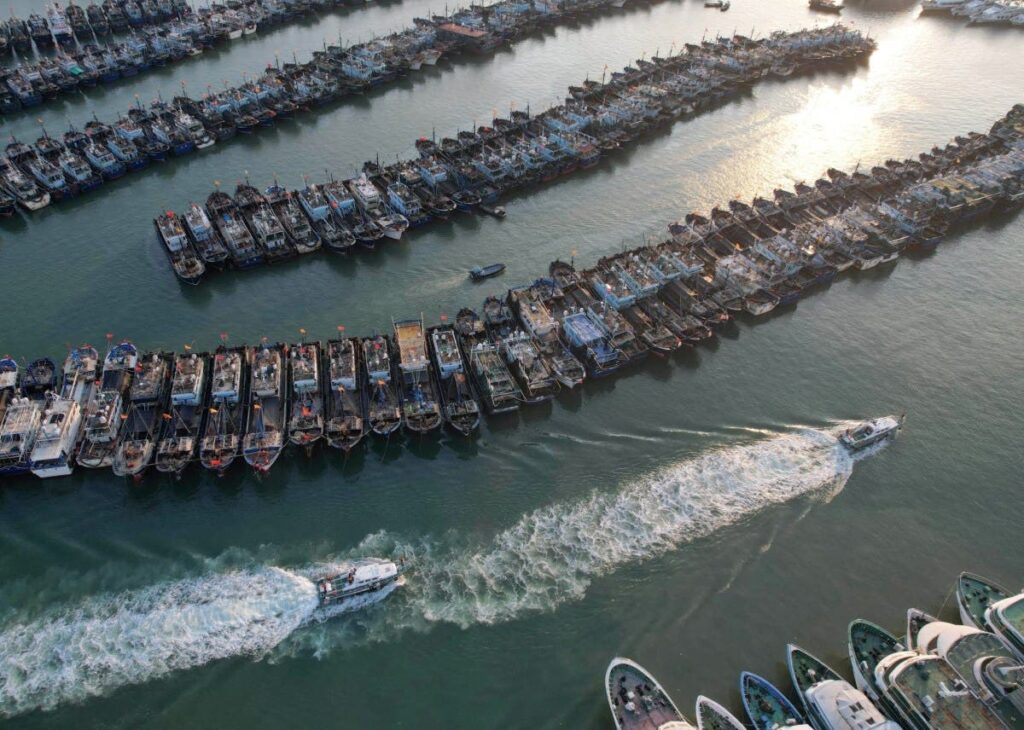China has defended itself as a “responsible fisheries country” after the unusual presence of its large fishing fleet off Chile raised concerns over declining catches in recent months.
Chilean fishermen accused Chinese fishing vessels of depleting Humboldt squid, one of the region’s most-valuable resources, describing them as “termites” in the ecosystem.
In a statement on Friday, the Chinese Embassy in Chile said that China strengthens supervision of the country’s deep-sea fishing by conducting 24-hour monitoring of its vessels and requiring them to report their positions hourly, far exceeding international standards.
Why It Matters
The global presence of Chinese fishing vessels has alarmed other countries, as they are suspected of engaging in illegal, unreported and unregulated (IUU) fishing, threatening ecosystems and the livelihoods of lawful fishers. Earlier this year, Argentina deployed its naval force to patrol its exclusive economic zone (EEZ) to deter foreign vessel intrusions.
What To Know
In addition to having the world’s largest navy and coast guard by hull count, China operates over half-a-million commercial fishing vessels, making it the largest globally. Its distant-water fishing fleet accounted for 44 percent of global fishing activity between 2022 and 2024, according to the Washington, D.C.-based conservation group Oceana.
Oceana said on Wednesday that 121 Chinese fishing vessels have made port calls in Chile this year, compared with five in 2023 and seven in 2024, as they no longer stop at ports in Peru, which recorded 155 and 205 vessels in 2023 and 2024, respectively.
Citing the Iquique Fishermen’s Federation in the northern Chilean port city, Radio Bío-Bío reported that local fishers have not encountered Humboldt squid for three months, as Chinese vessels were suspected of disrupting the squid’s migration toward the coast.
Footage and images released by the Chilean Navy on the social-media platform X in recent days show Iquique’s maritime authority inspecting foreign fishing vessels off the city to verify their compliance with legal regulations and international agreements.
One of the foreign vessels being inspected can be identified from a Chilean Navy photo as PU YUAN 805, which sails under the flag of China. The maritime analytics provider MarineTraffic said the vessel’s last trackable data placed it off northern Chile last week.
According to the Chilean Navy, no foreign fishing activity was observed within the South American country’s EEZ, which extends up to 230 miles from its coastline under the United Nations Convention on the Law of the Sea.
Coastal states have the exclusive right to manage and use all natural resources within their EEZs, including fish, according to Oceana’s Global Fishing Watch. They can prohibit foreign vessels from fishing in their EEZs or allow it in exchange for payment.
In response to concerns over Chinese illegal fishing, the Chinese Embassy in Chile said in the statement that local fisheries and military authorities have confirmed that port calls by Chinese fishing vessels comply with Chilean laws and international treaties.
The Chinese embassy added that there is no evidence that Chinese fishing vessels have conducted operations within Chile’s EEZ, and said that accusations they evade supervision and engage in illegal fishing are “completely without factual basis.”
“The resupply, repair and personnel rotation of Chinese deep-sea fishing vessels in Chilean ports also contributes to generating local economic income, boosting employment and the development of the service sector,” the Chinese statement read.
What People Are Saying
Iquique fishermen’s leader Luis Tapia told Chile’s Radio Cooperativa on October 7: “We want a government presence, drones and coordination with neighboring countries. This isn’t just about protecting the Humboldt squid—it’s about safeguarding the entire marine ecosystem.”
The Chilean Navy said in a post on X on October 7: “Fourth Naval Zone, through surface and aeronaval units, maintains constant monitoring of the foreign fishing fleet located off the coasts of Iquique, verifying compliance with current regulations and laws.”
The Chinese Embassy in Chile said in a statement on Friday: “China actively participates in international cooperation to combat illegal, unreported, and unregulated fishing, seriously investigates all leads of suspected offending vessels, and, once verified, adopts a zero-tolerance attitude.”
What Happens Next
It remains unclear whether other countries in South America will tighten regulations on foreign fishing activity within their EEZs amid the presence of Chinese vessels.
Read the full article here

